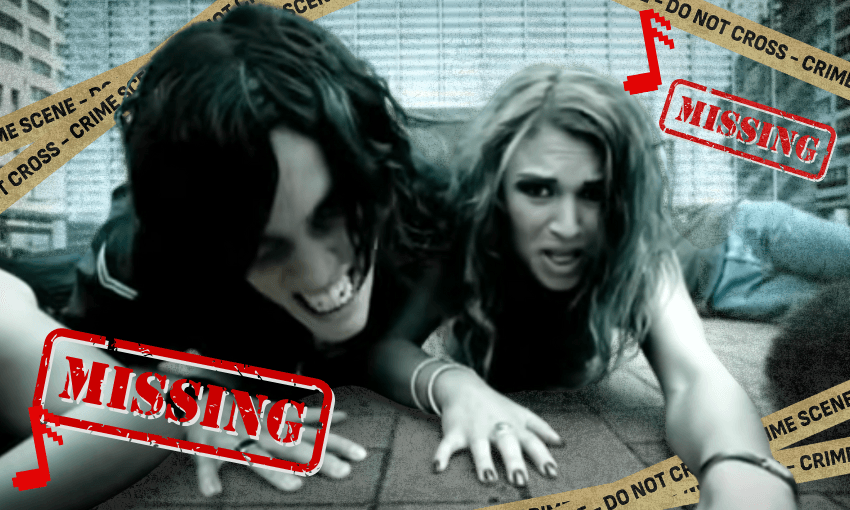Jack Joyce is given time powers while at ground zero at a time travel experiment accident caused by his bestie Paul Serene. It’s only the bloody end of time, innit? The Spinoff wraps up its Quantum Break coverage with a musing on the AAA game’s most interesting element: the story.
The ubiquitous visual motif of Remedy Entertainment’s Quantum Break is objects and people fracturing in time. In this world time is coming to an end and time anomalies (or stutters) are everywhere; their most immediate effect is to fragment people, dispersing them like attempts to reform drug policy.
The visual theme is an apt one, the game it serves is just as fragmented as the poor in-game sods who get buzzed with chronon particles (actually a thing! Well, a theoretical thing) – the mysterious Force-like energy that does triple duty powering Quantum Break’s protagonists, antagonists and providing the story’s unobtanium. In other words elements pull the game this way and that: it draws heavily on cinematic conventions, particularly that of the sci/fi action genre, yet in the multitude of press around the game it’s often referred to as a TV show; at crucial points in the story you’re asked to choose between two different paths the direction of the story will take, yet there’s only one conclusion to the game (although as we’ll see, that’s thematically appropriate) ; it’s at once a po-faced drama and a kooky, wise-cracking action-comedy.
None of this is in itself a problem, but does it work for Quantum Break?
The audience response has been just as dithering as the game, from reviews branding it a “costly mistake” to others claiming it as “timeless” classic. It’s been a while since a game prompted such a diverse reaction. Maybe everyone’s just confused? Muddled in the head from all those lattes they drank when they should have been buying houses?
You can say many things about Quantum Break, but you can’t say Remedy doesn’t have ambition. The “junction” mechanic, where at certain places during the game you decide on the direction of the story, featured heavily in the pre-launch promotion. In reality decisions made by the player at these points matter very little to the outcome of the game. The illusion of free will is a feature of all video games. However, Remedy is still effective in drawing you into the story of the game, and that’s where Quantum Break‘s strengths lie.
The lead character Jack Joyce (played by Shawn Ashmore) plummets head first through time travel and a grand conspiracy. Happily, what keeps us following him is the delicious little mysteries laid out for us: what exactly is former Joyce buddy and now big bad Paul Serene (Aidan Gillen) really up to? What exactly is the deal with Serene’s scheming right hand man Martin Hatch (Lance Reddick) who apparently appeared from nowhere? Will people stop shooting Liam Burke (Patrick Heusinger)?
The much boasted about “TV episodes” that run after each junction point do work. They prove to be tightly paced bits of story focusing on some of the liminal characters and actually feel like good breathers in between the nonstop action of the player directed mayhem. The acting is top notch, particularly from old reliable Lance Reddick who goes about menacing every character he meets with his eyelids.
There’s also a great sense of humour lurking in the corners while the main action of saving the universe thunders on in the foreground. Most notably the remains of a screenplay littered throughout the game. It’s highly recommended you read these when you come across them (or you can just watch a live reading by some of the game’s cast). That, the occasional asides by the characters and what happens if you pirate the game makes me think it’s time for Remedy to give in and put out a full comedy title.
But what’s really being explored here is the idea of free will. The sci-fi conception of time travel has some serious connotations for the notion we all exist in random, totally free universe. If you go back in time to stop David Tua saying “O for awesome” on Wheel of Fortune, but accidentally cause him to utter the line, you’d be a bloody hero if you didn’t fall into a wine cellar and start drinking all the contents in an attempt to drown out the existential horror. The metaphysics are made utterly personal by a script that isn’t afraid to explore what questions of time travel and identity might do to someone forced to answer them. You’re constantly told in time travel stories that you can’t change the past; Quantum Break shows you why. If this is what the confluence of gaming and TV/film media means then I’m all for it.
Alas, it starts to unravel a bit by the end of the game. The aforementioned mysteries that propel you through the game and keep you hooked are almost completely explained away by the usual video game detritus of personal logs and emails. It’s actually mind-numbing to even try and think about why anyone thought that might have been a good idea. Some of the reveals are flubbed, they don’t seem to carry the dramatic weight they should have and the conclusion feels a bit like pulling a tablecloth out from under a set table. It’s exciting, although the final battle won’t tax experienced gamers for too long, but perhaps it suffers from the heavy handed set up of the inevitable sequel.
Despite its problems there should be a decent amount anticipation for another Quantum Break. It’d be a shame if we never got the chance to have another hoon with Jack Joyce and friends.
They traveled from 1000 years in the future to sponsor quality online gaming content, they are Bigpipe. An ISP that will punch your face through time.



